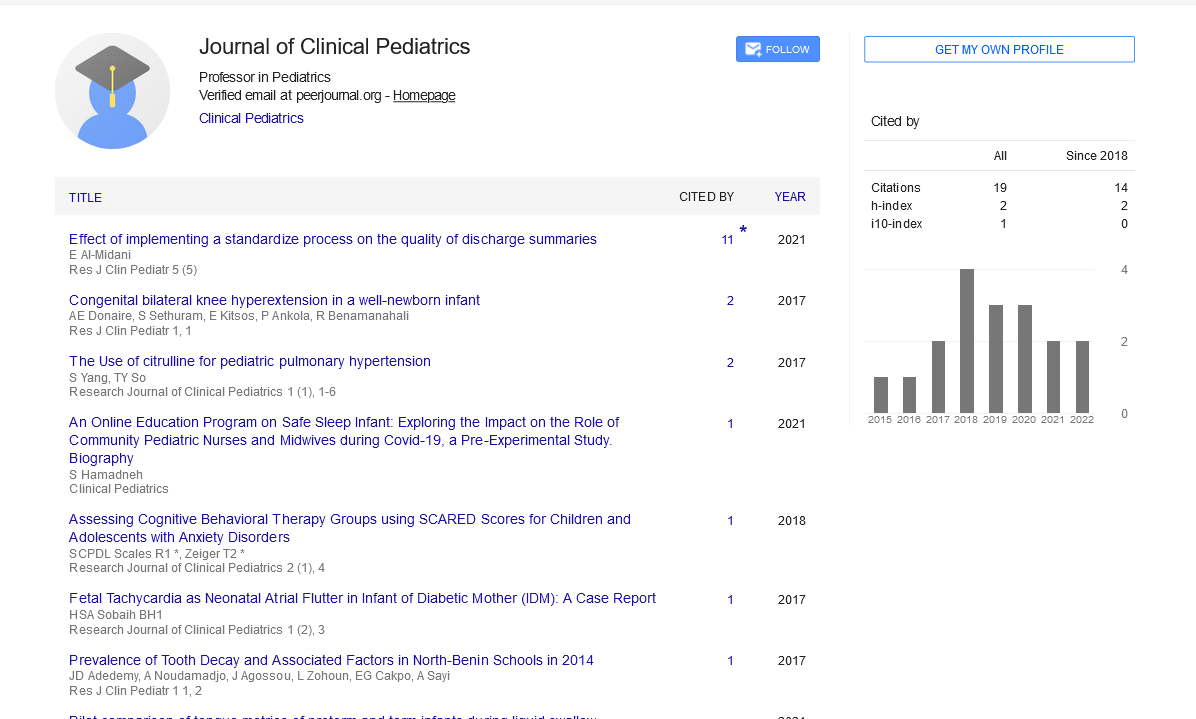Perspective, Res J Clin Pediatr Vol: 7 Issue: 3
Exploring the Cognitive Mechanisms of Child Psychology and its Effects
Williams Benyle*
1Department of Psychological and Brain Sciences, University of Iowa, Iowa City, USA
*Corresponding Author: Williams Benyle,
Department of Psychological and Brain
Sciences, University of Iowa, Iowa City, USA
E-mail: Williams_benyle@ul21.edu
Received date: 23 August, 2023, Manuscript No. RJCP-23-117475;
Editor assigned date: 25 August, 2023, PreQC No. RJCP-23-117475 (PQ);
Reviewed date: 08 September, 2023, QC No. RJCP-23-117475;
Revised date: 15 September, 2023, Manuscript No. RJCP-23-117475 (R);
Published date: 22 September, 2023, DOI: 10.4172/Rjcp.1000151
Citation: Benyle W (2023) Exploring the Cognitive Mechanisms of Child Psychology and its Effects. Res J Clin Pediatr 7:3.
Description
Child psychology is a field of study that delves into the intricacies of the developing mind, exploring the cognitive mechanisms that cause a child's thinking, reasoning, and emotional development. Understanding these mechanisms not only provides valuable insights into the inner workings of a child's psyche but also has profound effects on their lifelong development and well-being. Child psychology examines a multitude of cognitive mechanisms that significantly influence a child's development. Early in life, children begin to make sense of their environment through their senses. They explore the world through touch, sight, sound, taste, and smell. Understanding how children perceive and process sensory information is fundamental to grasping their early cognitive development. This insight helps in developing environments that stimulate sensory exploration, fostering cognitive growth.
The mechanisms of attention and memory are instrumental in a child's ability to learn and retain information. As children grow, their attention spans and memory capacities evolve. The study of these cognitive processes can help in developing educational strategies that are suitable to the cognitive development stage of the child, optimising learning outcomes. Language development is a complex cognitive process that shapes a child's ability to communicate and express themselves. By understanding how children learn and develop language skills, caregivers, educators, and speech therapists can provide the support and interventions necessary for effective communication.
Executive functions are higher-level cognitive skills that include impulse control, planning, problem-solving, and decision-making. These skills are essential for success in school and later in life. By identifying the stages of executive function development, professionals can develop interventions that help children develop these essential life skills.
The development of "Theory of mind," or the ability to understand and attribute mental states to oneself and others, plays a pivotal role in social interactions, empathy, and emotional intelligence. Understanding the mechanisms behind this cognitive process provides insights into emotional development and healthy social relationships. The exploration of cognitive mechanisms in child psychology holds significant effects on various aspects of a child's life and their overall development. Early detection of developmental difficulties or delays can be achieved by experts through an understanding of how children's cognitive mechanisms change. Early intervention often leads to more successful outcomes, as targeted support can address potential hurdles and set children on a path toward healthier cognitive development.
Insights into cognitive mechanisms enable educators to develop more effective teaching strategies. By recognizing where a child falls on the cognitive development spectrum, educators can design individualized learning plans that suit their unique needs, fostering a more engaging and effective educational experience. Identifying the cognitive mechanisms behind emotional development and the processing of challenging emotions can be instrumental in identifying and addressing mental health issues in children. Early intervention and support for emotional well-being can have lasting positive effects.
Parents and caregivers play an essential role in a child's cognitive development. Equipped with knowledge about cognitive mechanisms, they can provide a nurturing and stimulating environment that fosters optimal cognitive growth. This understanding also assists in managing and addressing common challenges in child-rearing. Policymakers can draw from studies on cognitive mechanisms to formulate early childhood education policies and programs that support cognitive growth and readiness for school. In turn, these policies can help reduce educational disparities and ensure that all children have access to quality early education.
Conclusion
Exploring the cognitive mechanisms of child psychology is not merely an academic pursuit it is a pathway to a brighter and more equitable future for children. The significance of this innovation extends from early intervention and suitable education to the promotion of mental health and the formulation of effective policies. By gaining a deeper understanding of the cognitive mechanisms that shape a child's world, one can empower them to reach their full cognitive potential and set the stage for a lifetime of learning, growth, and well-being.
 Spanish
Spanish  Chinese
Chinese  Russian
Russian  German
German  French
French  Japanese
Japanese  Portuguese
Portuguese  Hindi
Hindi 
